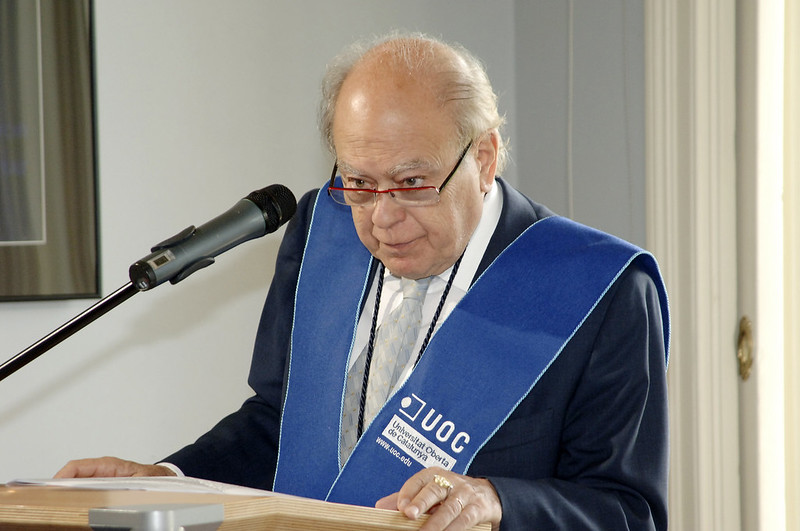Curriculum Vitae

Professional background
Barcelona, 1930. Graduated in Medicine from the University of Barcelona. The family setting, which was markedly Catalan nationalist, created an atmosphere which, from an early age, guided his desire to fight for democracy and the recuperation of the Catalan identity. During his time at university, he formed part of a number of nationalist and anti-Franco groups: Grup Torras i Bages, Comissió Abat Oliva, Grup Pere Figuera or Confraria de la Mare de Déu de Montserrat of Virtèlia; and spent time with figures such as Jaume Carner or Joan Raventós, Jaume Vicens Vives, Josep Benet, Joan Triadú and Raimon Galí, who he saw as role models. During the 1950s, he focused on an ideological self-education. His fight against the loss of freedom and rights and in favour of the reconstruction of Catalonia led to his being arrested and imprisoned in connection with the fets del Palau de la Música (events at the Music Hall, disturbances in May 1960 linked to a homage to a Catalan poet, Joan Maragall). From the 1960s onwards, he undertook a number of wide-reaching cultural, economic and social initiatives including Banca Catalana, the CIRP (Centre for Information, Research and Promotion), which was to finance Catalan dictionaries, offer support to publishers such as Lavínia, record companies such as EDIGSA and a number of magazines and campaigns in favour of the Catalan language. During the 1970s, he started his political career with the creation, in 1974, of Convergència Democràtica de Catalunya, a party which he is still the president of. In 1977, he became a member of parliament in the Congress in Madrid. He was re-elected in 1979. In 1980, he won the elections to the Parliament of Catalonia and was named President of the Generalitat, a position he was to hold until 2003. His work in government was decisive in providing the backbone to Catalan autonomy. During his time in office, he strongly promoted the creation of the UOC (the Open University of Catalonia), which opened in 1994. His strong feelings for Europe saw him elected, in 1992, President of the Assembly of European Regions. Besides his political career, and his cultural, economic and social concerns, his intellectual studies have also led to his writing a number of works in order to pass on his European ideals, fundamentally focused on the Catalan question.
He is currently President of the Centre d'Estudis Jordi Pujol, whilst also giving courses in universities and taking part in forums and international political round tables. He has also taken up his passion of writing on politics, identity and values once again.
Distinctions and decorations
Jordi Pujol has been honoured by a great many bodies, governments and institutions, from which he has received, to date, fourteen diplomas, four gold medals, twelve decorations and fifteen degrees, from which we would highlight the doctorates Honoris Causa from the following universities:
- National University of Rosario (Argentina)
- University of Toulouse
- Catholic University of Brussels
- University of Lyon 2 Lumière
- Eötvös Loránt University, Budapest
- Suwon University (Korea)
- University of Wales
- Ramon Llull University
- University of Paris 8
Most important publications
- Una política per Catalunya, 1976
- La immigració, problema i esperança de Catalunya, 1976
- Des dels turons a l'altra banda del riu, 1978
- Construir Catalunya, 1979
- Als joves de Catalunya, 1988
- Catalunya Espanya, 1996
- Tot compromís comporta risc, 1997
- Passió per Catalunya, 1999
- Antologia política de Jordi Pujol, 2003
- Sobre Europa (i altres coses), 2004
